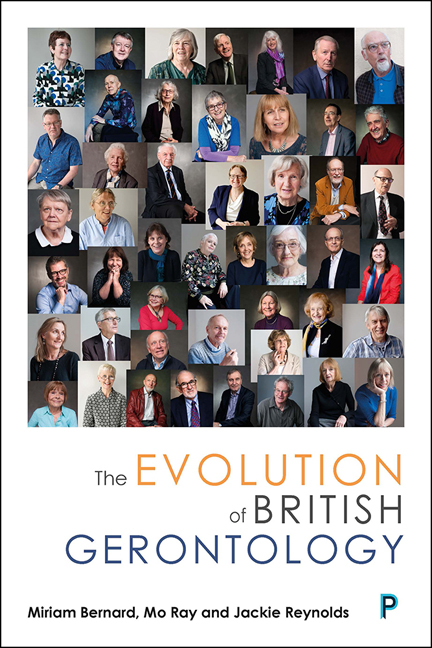Book contents
- Frontmatter
- Dedication
- Contents
- Acknowledgements
- PART I The Ageing of British Gerontology
- PART II Learning from the Past
- PART III Lives and Careers in Gerontology
- PART IV Informing the Future
- Appendix 1: Timeline: Policies, Research Programmes, Organisations and key Events
- Appendix 2: Conference themes, sub-themes and Selected Topics, 1971– 2018
- Bibliography
- Index
3 - The Development of Gerontology
Published online by Cambridge University Press: 25 February 2021
- Frontmatter
- Dedication
- Contents
- Acknowledgements
- PART I The Ageing of British Gerontology
- PART II Learning from the Past
- PART III Lives and Careers in Gerontology
- PART IV Informing the Future
- Appendix 1: Timeline: Policies, Research Programmes, Organisations and key Events
- Appendix 2: Conference themes, sub-themes and Selected Topics, 1971– 2018
- Bibliography
- Index
Summary
Introduction
Following the introduction to the project and the participants in Part I, this chapter continues the sociohistorical exploration of the evolution of British gerontology begun in Chapter 1. We consider first the political and policy environment out of which gerontology arose and show how it developed across the 20th century and into the current millennium. Paralleling and underlying these developments has been the rapid growth of national and international research and knowledge about ageing and old age. Second, using testimony from the interviews, we examine advances in research and education, noting in particular some of the milestones in gerontology's evolution in the UK. The chapter draws to a close by assessing the role and contribution made by the British Society of Gerontology (BSG), the professional organisation representing gerontologists in Britain. These discussions are aided by – and can be cross-referenced with – the research and policy timeline in Appendix 1.
Politics, policies and practices
Inevitably, the evolution of British gerontology is closely interwoven with the political climate of the time. This has been particularly true over the period we were completing the project and beginning to write this book, endeavours undertaken in the shadow of the upheavals and uncertainties that followed in the wake of the June 2016 referendum in favour of taking the UK out of the European Union after more than 40 years of membership. We reflect further on the consequences and implications of such political changes in the concluding chapter. For the time being, we turn our attention to sketching in the political and policy context to gerontology's evolution during the 20th century and into the first decades of the new millennium. The timeline in Appendix 1 provides a framework for these discussions, noting major policy documents and changes of government. In the narrative which follows, we put a little flesh on these bare bones. Readers wanting more detailed historical accounts are invited to follow up the references cited in this chapter. We are mindful too of project participant Alan Walker's observation that summary accounts such as these are ‘prone to sweeping generalisations’ but are necessary ‘to convey the important broad transformations that have taken place in the public policy discourses accompanying population ageing’ (Walker, 2014b: 245).
- Type
- Chapter
- Information
- The Evolution of British GerontologyPersonal Perspectives and Historical Developments, pp. 95 - 118Publisher: Bristol University PressPrint publication year: 2020

